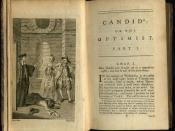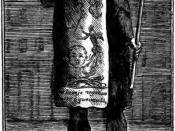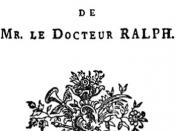As the title of the book suggests, Candide is synonymous with optimism. Pure and unbelievably naive, Candide follows the philosophy taught him by Pangloss that this is the best of all possible worlds. Voltaire uses Candide as a tool to show the absolute ludicracy of complete optimism. At points Candide calls into doubt the credibility of Pangloss' philosophy, but is sure to return to it when even the slightest bit of hope rears its head. This undying optimism, however foolish it is portrayed throughout the book, does provide for Candide that which is nearly impossible for the other characters in the novel to find; happiness. Though it may be out of naiveté or ignorance, Candide is happy at many points in the book, especially any point where he has a chance to see his darling Cunegonde again. He seldom dwells on his misfortunes, and looks to the future for hope while many of the other characters mull over what a horrid existence they lead.
The Venetian Nobleman, Lord Pococurante relates to Candide in a manner slightly different than most of the other characters. While most other characters differ from Candide by their pessimism (most notable Martin, who seems to be the antitheses of Candide's optimism), Lord Pococurante is unhappy with life because he is supremely jaded with what the world has to offer. He is thus Candide's opposite as much as Martin, though the opposition is based upon the noble's jaded state versus Candide's naive one. By the book's conclusion Candide is no longer convinced of Pangloss' philosophy, throwing out systematic optimism. Voltaire has thus used Candide to show the effects of optimism in practice on one's life, and also to reject the theory, effectively showing Voltaire's opinion on this philosophy popularized by Alexander Pope in his Essay...


